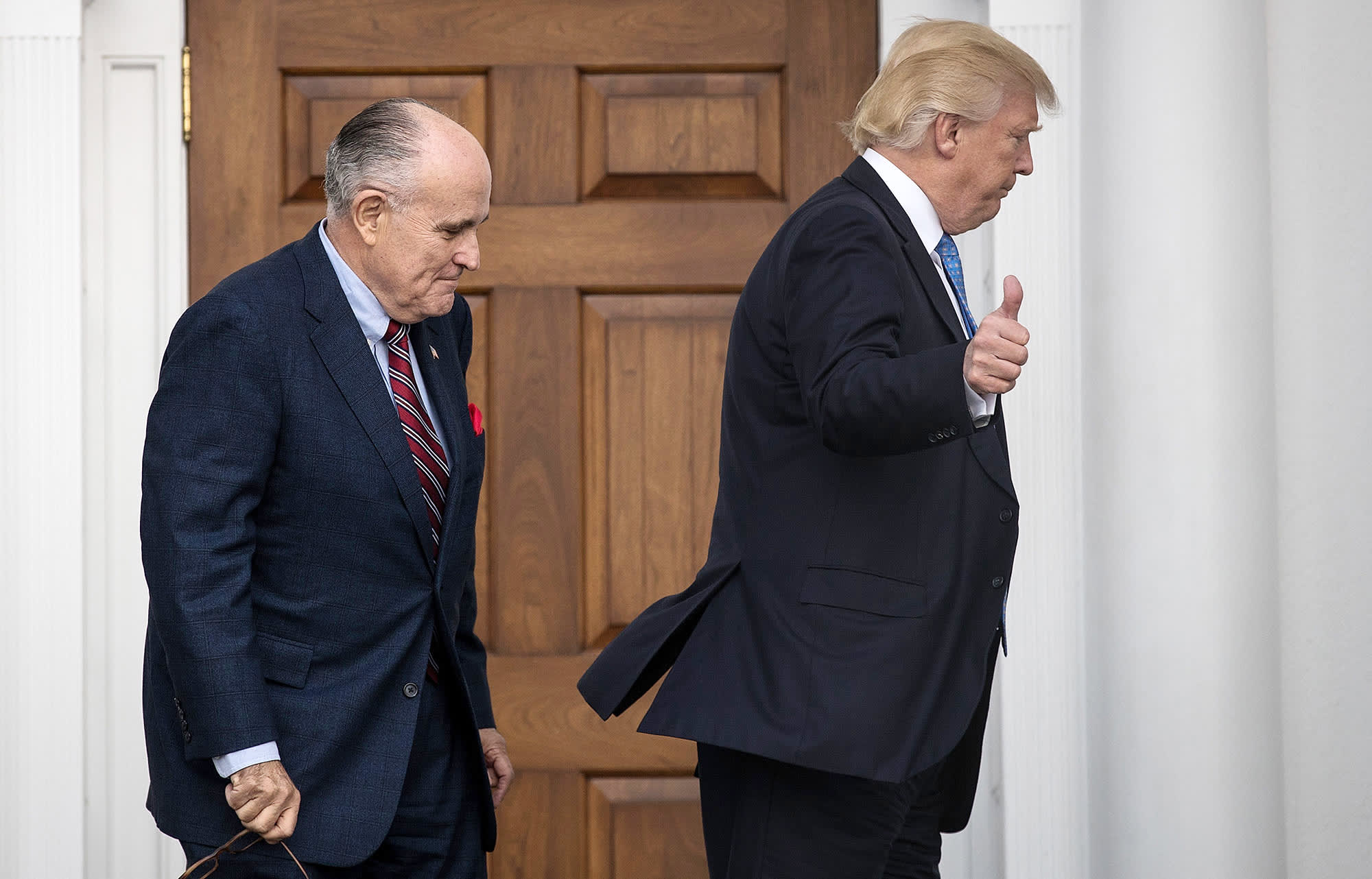
Former New York City mayor Rudy Giuliani and president-elect Donald Trump head into the clubhouse for their meeting at Trump International Golf Club, November 20, 2016 in Bedminster Township, New Jersey.
Getty Images
Former President Donald Trump and his onetime personal lawyer Rudy Giuliani on Thursday asked a federal judge to dismiss a lawsuit accusing them of conspiring to incite the deadly invasion of the U.S. Capitol.
The lawsuit, brought by Rep. Bennie Thompson, D-Miss., and 10 other House Democrats, accuses the defendants of violating the federal Ku Klux Klan Act on Jan. 6 by fomenting a mob of Trump’s supporters to stop Congress from confirming President Joe Biden‘s electoral victory.
Separate motions to dismiss the suit on Thursday argued that Trump’s and Giuliani’s remarks at a pre-riot rally near the Capitol were protected under the First Amendment.
Trump at that event had heaped pressure on Republican lawmakers — as well as then-Vice President Mike Pence, who was presiding over the joint session — to reject key states’ electoral results. He called on his followers to march to the Capitol, and told the crowd, “If you don’t fight like hell you’re not going to have a country anymore.”
But Trump’s lawyer Jesse Binnall noted at the top of his dismissal request that Trump had also told the audience to “peacefully and patriotically make [their voices] heard.”
Democrats’ claims “directly contravene the absolute immunity” conveyed by the Constitution on the then-president and “fail to plausibly plead any viable conspiracy theory” against Trump, Binnall said.
U.S. President Donald Trump’s personal lawyer Rudy Giuliani gestures as he speaks as Trump supporters gather by the White House ahead of his speech to contest the certification by the U.S. Congress of the results of the 2020 U.S. presidential election in Washington, U.S, January 6, 2021.
Jim Bourg | Reuters
Giuliani during the rally had called for “trial by combat.” But the former New York mayor’s lawyer argued in his motion to dismiss Thompson’s lawsuit that “no reasonable reader or listener would have perceived Giuliani’s speech as an instruction to march to the Capitol, violently breach the perimeter and enter the Capitol building, and then violently terrorize Congress into not engaging in the Electoral Certification.
The Democrats’ conspiracy claim “defies all plausibility and believability on its face,” Giuliani’s lawyer wrote.
The lawsuit also names as defendants the extremist groups the Oath Keepers, the Proud Boys and Warboys.
The Oath Keepers filed their own motion to dismiss the case Thursday morning, arguing that the Democratic lawmakers lack “standing,” or the ability to sue based on the alleged injury they have received by the defendants.
The mob on Jan. 6 broke through lines of police officers outside the Capitol, leading hundreds of rioters to flood into the building. They physically attacked law enforcement, broke windows, burst into congressional offices, vandalized the grounds and stole property.
The invasion forced a joint session of Congress to evacuate their chambers and hide for their safety, temporarily derailing the lawmakers’ efforts to confirm Trump’s loss to Biden.
Thompson’s lawsuit, filed in U.S. District Court in Washington in February, accused Trump and Giuliani of launching a “concerted campaign to misinform their supporters and the public, encouraging and promoting intimidation and violence in furtherance of their common plan to promote the re-election of Defendant Trump, even after the states had certified election results decisively showing he lost the election.”
That campaign, which included an effort to stop Congress from counting the Electoral College votes on Jan. 6, was undertaken “for the purpose of seeking to prevent Plaintiff Thompson and other members of Congress from certifying that former Vice President Biden won the presidential election,” Thompson’s lawsuit said.
In April, 10 more House members signed on to the lawsuit. They are: California representatives Karen Bass, Barbara Lee and Maxine Waters; Steve Cohen of Tennessee; Bonnie Watson Coleman of New Jersey; Veronica Escobar of Texas; Hank Johnson Jr. of Georgia; Marcy Kaptur of Ohio; Jerry Nadler of New York; and Pramila Jayapal of Washington state.




